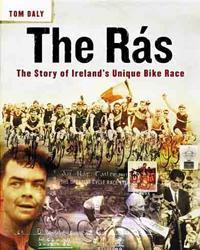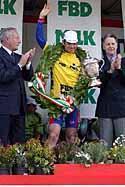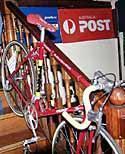
Recently on Cyclingnews.com |
More book reviews |
Book review - November 30, 2003
The Rás - The Story of Ireland's Unique Bike Race by Tom Daly
Discover the history of Ireland's biggest race

|
The Irish Milk Rás has been run every year since 1953, and during that time has accumulated a rich history. Irishcycling.com's Shane Stokes reviewed Tom Daly's book on the race, and was not disappointed.
The rich heritage and memorable characters of the Rás Tailteann are documented and celebrated in the fine new book, The Rás - The Story of Ireland's Unique Bike Race, by Tom Daly. Examining the reasons behind the organisation of the first 1953 race (the bitter NCA-CRE relationship is a big factor), detailing the major personalities both on and off the bike and documenting the myriad of anecdotes and stories which have occurred during the race's 51 editions, the book will fascinate those involved in cycling, Irish sport and also anyone else with an interest in events such as the Rás.
Tom Daly's book is clearly a labour of love, given the massive amount of research which a work such as this necessities. The list of interviewees in the dedications section is staggering, and as a result of all this painstaking information gathering there are many fascinating stories and accounts within the three hundred-plus pages.
Read about the NCA-CRE battles and hostilities, the blacklisting of those who dared train with friends in rival federations and the highly controversial events relating to the 1972 Olympics in Munich. The feats of characters such as Joe Christle, Shay O'Hanlon, Paddy Flanagan and others are discussed, as are the great battles which have occurred over the years. The 'Italian affair' of 1992 also features in great length and is a reminder of how ferocious (and sour) the fight for the final yellow jersey can be. On that final stage future professional stars Wladimir Belli and race leader Giuseppe Guerini lost out due to foul play on the part of some of the Irish riders, with the Italians being impeded as they tried in vain to preserve their grip on the jersey. It is one of the most shameful events in the history of the race, and while the actions of a few were heavily criticised by many fairer minded Irish riders, no Italian team has been back since.
In addition to the pictures painted in this atmospheric account, over 200 photographs illustrate the pages and depict scenes from the great race over the years. The changing look of the country through the ages is evident from the shots, as are the effects of the passage of time on some of the well known faces in the sport. But even for those who have never seen the race or its current incarnation, the 2.5 ranked FBD Milk Rás, this is a fascinating and highly recommended piece of work.
Book extract: Early Glory On The Roads Of Ireland

|
Stephen Roche won many races in his thirteen year pro career, including the Tour de France, Tour of Italy and World Championships in 1987. For many the first glimpse of his future brilliance was seen on the roads of the 1979 Rás in Ireland. This extract from Tom Daly's excellent new book, The Rás - The Story of Ireland's Unique Bike Race, tells the story of that victory, plus the many other champions, characters, events and stories that play a part in the fascinating history of the event now known as the FBD Milk Rás.
1979 was a watershed year in Irish cycling with riders from the three cycling bodies able to compete together. This followed the setting up of the Irish Cycling Tripartite Committee in 1978 - the first formal structure to facilitate the unification process that had been in train since 1972. Under this arrangement, the three cycling organisations still existed as independent bodies and ran their own events, but all members could compete in races organised by the others. It was a huge breakthrough, an emotional time for some, and the 1979 Rás was a landmark event as it brought together many of the top riders and senior officials in Irish cycling for the first time in decades. While open to all, the Rás was run by the NCA under the new arrangement and this was to continue until the unification process was progressed further in 1987 when the three bodies amalgamated to become the Federation of Irish Cyclists (FIC).
Each of the three organisations had its own team in the 1979 event. The NCA team - under the name 'Ireland' - was comprised of Séamus Kennedy, Paddy Flanagan, Denis Devin and Pat McHugh. The ICF team included Tony Lally, John Shortt, Oliver McQuaid, Alan McCormack and Stephen Roche. The Northern Ireland Cycling Federation sent two teams - its A team consisted of Billy Kerr, Brian Stevenson, Pat McGarrigle, Aidan McKeown and Pat Shearer.
The unification process also helped to boost funding from the Department of Health and it had been marketed as the 'Health Race' from the previous year. While still depending on its volunteer base, this brought a very professional marketing element to the race and its organisation benefited accordingly. For the first time, there was over 100 riders in the event.
In spite of the new and exciting developments, the event got off to a rather ignominious start. The first stage from Dublin to Longford was 40 minutes late in setting off and there was confusion about results at the finish. Worse was to follow at the evening time trial when the results were found to be unreliable. After much confusion, it was announced that the results were scrapped and the stage did not count. Officials explained that gaps in the starting order caused by riders who had entered but not started had not been allowed for. The débâcle understandably caused much annoyance to riders.
Aside from this difficulty, and it being the first 'unity' Rás, the 1979 event is best remembered for the performance of the nineteen-year-old Stephen Roche. He was not hotly tipped prior to the event all the ICF riders were considered potential winners, while Billy Kerr from the NICF team was probably favourite - but Roche’s performance, in terms of both physical and mental strength for one so young, left a lasting impression on those who witnessed the front of the race for its duration.
His main opposition eventually came from within his own team - something the manager had obvious difficulty in controlling. Alan McCormack considered himself to be the established leader and felt that Roche was challenging him. Roche went into yellow on the fourth stage, to Caherciveen, but two days later, on the road to Carrick-on-Suir, he had to do hard riding at the front of the bunch to stay in touch with team-mates, Oliver McQuaid and Alan McCormack, who had gone away with a French rider. McCormack had another go on the second-last day, to Navan, but Roche dismissively nullified the threat with a devastating surge out of the bunch, across to McCormack.
One of the biggest sensations of the Rás was Roche's defeat of Billy Kerr in the 16-mile (26km) time trial on the morning of the final day. Such was Kerr's time trialling reputation, pre-Rás predictions had anticipated he might win the race on this stage. Roche, however, beat him by 11 seconds and did so with apparent ease, cheerfully waving to the crowd on the run-in and even finding time for a few words for the veteran reporter, Jim McArdle, as he passed by car. Indeed, McArdles final headline of the event summed it up: "Roche made it all look so incredibly easy", and he went on to state that Roche "was the most impressive winner of any of the big stage races I have seen".

|
There was a great wave of enthusiasm amongst the riders for the joint participation in the 1979 Rás - "It was a breath of fresh air" - and there is little doubt that this enthusiasm was important in sustaining what was still a fragile unification process. To the younger riders especially, less aware as they were of ideological differences, it seemed to make utter sense that all should be competing together. Roche reflected this when he said that "the main question was why this hadn't happened before - it was a magnificent event".
Roche, of course, was heading for greater things. But his Rás victory was an important stepping-stone on that journey. His winning of the event, at a critical time in his development as a person and as a rider, was an important element in raising his expectations and setting his sights on the continental cycling scene. Eight year later, in the glorious year of 1987, he became assured of cycling immortality by becoming the only rider to emulate Eddy Merckx's feat of victory in the Tour de France, Giro d'Italia and World Championship in one year. Given such eminent world stature, it would be understandable if the memory and significance of the teenage win of a remote, amateur bike race in Ireland had slipped into the deeper recesses of his memory. This was not the case. When Merckx first met Roche after his triple win in 1987, Merckx congratulated him, saying: "Congratulations Stephen, we are equal now." Roche, in his typically mischievous way quipped: "No, we're not Eddie - you've never won the Rás."
Extract reproduced courtesy of Tom Daly and The Collins Press.
To order this book
The Rás - The Story of Ireland's Unique Bike Race is available at major bookshops, selected cycling shops and from www.collinspress.com.
ISBN No.: 1-903464-37-4
Publisher: Collins Press
Number of pages: 200, plus 200 b/w photos
Recommended retail price: €25.00 from Collins Press
Available: Major bookshops, selected cycling shops, www.collinspress.com
Cyclingnews Rating: ![]()
What do you think of the 'The Rás'? Let us know
Recent techTour tech: Zipp's slippery
new wheel revealed |

